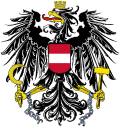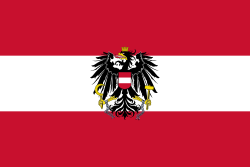No. Portrait Vice-Chancellor Took office Left office Time in office Party Chancellor — Koplenig, Johann Johann Koplenig (1891–1968) 27 April 1945 20 December 1945 days KPÖ Renner, Karl Karl Renner (SPÖ )19 Schärf, Adolf Adolf Schärf (1890–1965) 20 December 1945 22 May 1957 years, 153 days SPÖ Renner, Karl Karl Renner (SPÖ )Leopold Figl (ÖVP )Julius Raab (ÖVP )20 Pittermann, Bruno Bruno Pittermann (1905–1983) 22 May 1957 19 April 1966 years, 332 days SPÖ Raab, Julius Julius Raab (ÖVP )Alfons Gorbach (ÖVP )Josef Klaus (ÖVP )21 Bock, Fritz Fritz Bock (1911–1993) 19 April 1966 19 January 1968 year, 275 days ÖVP Klaus, Josef Josef Klaus (ÖVP )22 Withalm, Hermann Hermann Withalm [ de ] (1912–2003) 19 January 1968 21 April 1970 years, 92 days ÖVP Klaus, Josef Josef Klaus (ÖVP )23 Häuser, Rudolf Rudolf Häuser [ de ] (1909–2000) 21 April 1970 30 September 1976 years, 162 days SPÖ Kreisky, Bruno Bruno Kreisky (SPÖ )24 Androsch, Hannes Hannes Androsch (1938–2024) 1 October 1976 20 January 1981 years, 111 days SPÖ Kreisky, Bruno Bruno Kreisky (SPÖ )25 Sinowatz, Fred Fred Sinowatz (1929–2008) 20 January 1981 24 May 1983 years, 124 days SPÖ Kreisky, Bruno Bruno Kreisky (SPÖ )26 Steger, Norbert Norbert Steger (born 1944) 24 May 1983 21 January 1987 years, 242 days FPÖ Sinowatz, Fred Fred Sinowatz (SPÖ )Franz Vranitzky (SPÖ )27 Mock, Alois Alois Mock (1934–2017) 21 January 1987 24 April 1989 years, 93 days ÖVP Vranitzky, Franz Franz Vranitzky (SPÖ )28 Riegler, Josef Josef Riegler (born 1938) 24 April 1989 2 July 1991 years, 69 days ÖVP Vranitzky, Franz Franz Vranitzky (SPÖ )29 Busek, Erhard Erhard Busek (1941–2022) 2 July 1991 4 May 1995 years, 306 days ÖVP Vranitzky, Franz Franz Vranitzky (SPÖ )30 Schüssel, Wolfgang Wolfgang Schüssel (born 1945) 4 May 1995 4 February 2000 years, 276 days ÖVP Vranitzky, Franz Franz Vranitzky (SPÖ )Viktor Klima (SPÖ )31 Riess, Susanne Susanne Riess-Passer (born 1961) 4 February 2000 28 February 2003 years, 24 days FPÖ Schüssel, Wolfgang Wolfgang Schüssel (ÖVP )32 Haupt, Herbert Herbert Haupt (born 1947) 28 February 2003 21 October 2003 days FPÖ Schüssel, Wolfgang Wolfgang Schüssel (ÖVP )33 Gorbach, Hubert Hubert Gorbach (born 1956) 21 October 2003 11 January 2007 years, 81 days BZÖ Schüssel, Wolfgang Wolfgang Schüssel (ÖVP )34 Molterer, Wilhelm Wilhelm Molterer (born 1955) 11 January 2007 2 December 2008 year, 326 days ÖVP Gusenbauer, Alfred Alfred Gusenbauer (SPÖ )35 Pröll, Josef Josef Pröll (born 1968) 2 December 2008 21 April 2011 years, 140 days ÖVP Faymann, Werner Werner Faymann (SPÖ )36 Spindelegger, Michael Michael Spindelegger (born 1959) 21 April 2011 1 September 2014 years, 133 days ÖVP Faymann, Werner Werner Faymann (SPÖ )37 Mitterlehner, Reinhold Reinhold Mitterlehner (born 1955) 1 September 2014 17 May 2017 years, 258 days ÖVP Faymann, Werner Werner Faymann (SPÖ )(act.) (ÖVP )Christian Kern (SPÖ )38 Brandstetter, Wolfgang Wolfgang Brandstetter (born 1957) 17 May 2017 18 December 2017 days Independent Kern, Christian Christian Kern (SPÖ )39 Strache, Heinz Heinz-Christian Strache (born 1969) 18 December 2017 22 May 2019 year, 155 days FPÖ Kurz, Sebastian Sebastian Kurz (ÖVP )40 Löger, Hartwig Hartwig Löger (born 1965) 22 May 2019 3 June 2019 days ÖVP Kurz, Sebastian Sebastian Kurz (ÖVP )41 Jabloner, Clemens Clemens Jabloner (born 1948) 3 June 2019 2 October 2019 days Nonpartisan Bierlein, Brigitte Brigitte Bierlein (Ind )42 Kogler, Werner Werner Kogler (born 1961) 7 January 2020 2 October 2024 years, 269 days Greens Kurz, Sebastian Sebastian Kurz (ÖVP )Alexander Schallenberg (ÖVP )Karl Nehammer (ÖVP )43 Babler, Andreas Andreas Babler (born 1973) 3 March 2025 Incumbent days SPÖ Stocker, Christian Christian Stocker (ÖVP )




















































